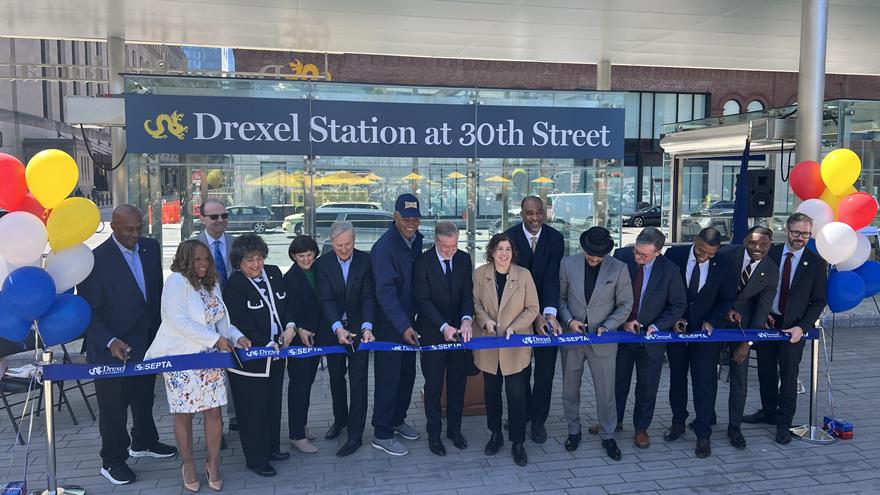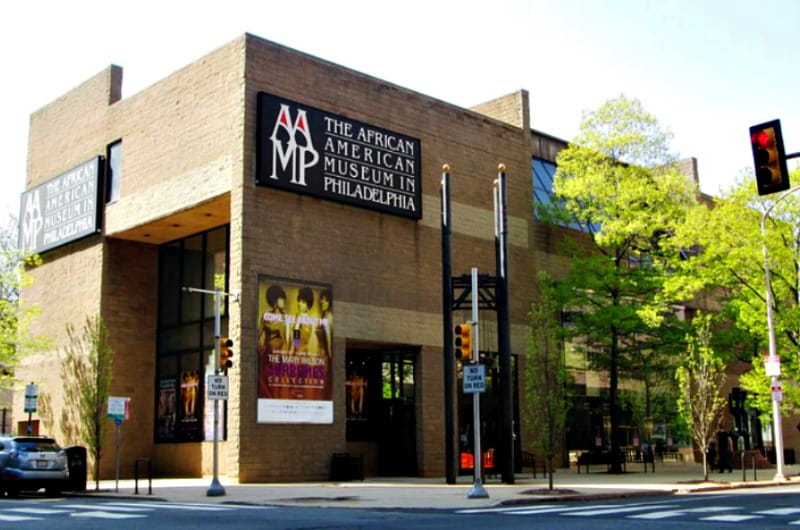Drexel Forms New Partnership with the African American Museum in Philadelphia

- Ribbon-Cutting Ceremony Marks Official Unveiling of Drexel Station at 30th Street
- Drexel’s Pearlstein Gallery Offers Spring Exhibitions Centered on the Healing Properties of Art and Creative Works
- Express Your Thoughts About Climate Change in the Anthems for the Anthropocene Contest
- 40 Years Ago, Drexel Made Computer — and Apple — History

From now until 2017, all Drexel students, faculty and staff members will have free access to the African American Museum in Philadelphia (AAMP), thanks to a collaboration with Drexel’s Center for Cultural Partnerships. Even better, graduate students in the Westphal College of Media Arts & Design will have the chance to work closely with the museum to develop strategic and architectural plans.
It’s all part of the center’s initiative to engage with nonprofit cultural organizations across the city, according to Vice Provost and Lenfest Executive Director Rosalind Remer. AAMP will be the first of many nonprofit organizations with which the University will work to improve some aspect of their operations. Additionally, Drexel community members will have the opportunity to become more familiar with those institutions through courses, co-ops, workshops and free admission opportunities.
“There are a lot of cultural institutions struggling to address and accommodate new audiences and a new generation,” said Remer. “We have that generation at Drexel. They’re working hard to get their degrees and do their co-ops and get jobs, but this is still a time when we can make these cultural resources accessible to our students and open their eyes to the great cultural resources of this city.”
For the next three terms, graduate students in Westphal’s Arts Administration and Architecture programs will work to improve certain targeted areas that the museum has identified. Arts administration graduate students will create a strategic plan for the museum this term. For summer and fall terms, two different architecture courses will use the museum as a case study to identify ways to make better use of its space and architecture, respectively.
Though the classes with AAMP are restricted to graduate students, Remer expects that future partnerships will bring opportunities for undergraduates on co-op or in a range of special topics courses. The institution’s experts could also be brought to campus for classes or special events as well.
As the first museum completely funded and built by a municipality in order to preserve and honor African American heritage, AAMP was chosen as the center’s first partner after the museum’s president submitted a proposal identifying target areas that need improvement. The institution includes many facets of African-American culture, history and arts, which made it an ideal, all-encompassing partnership for the center’s first foray. In the future, partnerships could also be forged with institutions that concentrate on visual or performing arts, or in historical fields.
Patricia Wilson Aden, the museum’s president and CEO, is delighted with the opportunity to work with Drexel.
“The partnership is groundbreaking,” said Aden. “The input provided by Drexel’s students and stellar staff will inform and empower AAMP’s board of directors as we make critical decisions regarding the museum’s future, while the Drexel community will be enriched by the access they will gain to AAMP’s exhibits and humanities-based programming.”
In addition to the students’ work with the museum, the center has brought in Makalé Faber Cullen, an outside consultant and specialist in visitor experience, to audit the museum’s current visitor experience and recommend alternative solutions.
The center also brought in Bruce Melgary, former executive director of the Lenfest Foundation, as its first senior fellow. During the next year or so, Melgary will use his expertise in the nonprofit sector to devise a strategic plan for the center as well as a comprehensive method of selecting and creating future cultural partnerships. He will also seek out the advice of the funding community to help Remer develop a sustainable model for the center.
“We don’t want to be redundant and do the same things that other universities in Philadelphia are doing,” said Melgary. “We want to do things that are uniquely Drexel. In this sense, that means matching the special skills that the University has in its programs and students with the needs of the nonprofits that we want to serve.”
When Drexel partnered with the Academy of Natural Sciences in 2011, the move signaled a change in the way that the University was perceived as a cultural institution in Philadelphia. After the announcement, other cultural institutions reached out to President John A. Fry about possibly connecting with Drexel. The Center for Cultural Partnerships was later created in 2015 in response to the outpouring of interest.
“This center is a way of broadening our reach and saying that Drexel can serve a really important role for these organizations and for the student experience,” said Remer. “If Drexel could become known more for its work in STEAM instead of STEM, and in the humanities, then we will have really made a difference with the center’s partnerships.”
If you know of a Philadelphia nonprofit cultural organization that might be a good fit for a future partnership with the Center for Cultural Partnerships, contact Remer at rr569@drexel.edu.
In This Article
Drexel News is produced by
University Marketing and Communications.
